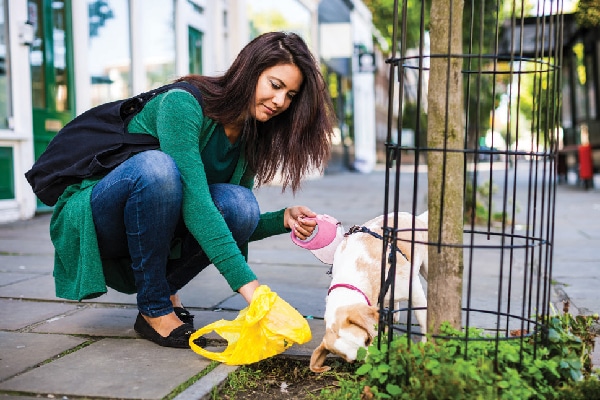Mucus in Dog Poop: What Does it Mean?
The post Mucus in Dog Poop: What Does it Mean? by Elizabeth Vecsi appeared first on Dogster. Copying over entire articles infringes on copyright laws. You may not be aware of it, but all of these articles were assigned, contracted and paid for, so they aren't considered public domain. However, we appreciate that you like the article and would love it if you continued sharing just the first paragraph of an article, then linking out to the rest of the piece on Dogster.com.
The ideal dog poop is firm, slightly moist and easy to pick up. If you notice mucus in dog poop (or if your dog’s poop is encased in a shiny mucus-like casing), your dog has some type of bowel inflammation. Mucus in dog poop is commonly seen in dogs with inflammatory bowel disease (IBD) or as an early warning sign of other health conditions.

Noticing mucus in dog poop? Here’s what it could mean. Photography ©GlobalP | Getty Images.
Mucus in Dog Poop and IBD
IBD is a syndrome as opposed to a disease, and it is caused by a specific reaction to chronic irritation of the intestinal tract. Most dogs with IBD have a history of recurrent or chronic vomiting or diarrhea and may have a poor appetite. In addition to mucus in dog poop, other signs of IBD include:
- Diarrhea
- Weight loss
- Depression
- Fatigue
- Chronic, intermittent vomiting
- Gas
- Abdominal pain
- Rumbling abdominal sounds
- Bright red blood in stool
- Distressed hair coat
Other Common Causes of Mucus in a Dog Poop
Mucus in dog poop can also be caused by parvovirus, parasites, tumors and/or polyps, constipation toxin overload, autoimmune disorders or even cancer. Eating garbage can also cause bacterial infection in the digestive tract that can lead to bloody stools or mucus in dog poop.
Is Mucus in Dog Poop Always a Concern?
You shouldn’t worry about seeing a small amount of mucus in dog poop. Dog stool normally contains some mucus, which is produced by the intestines to keep the lining of the colon lubricated and moist.
But if you notice an excessive amount of mucus in the stool, or if it is accompanied by blood or an obvious change in your dog’s bowel movements, seek immediate veterinary medical attention. The veterinarian will be better able to identify the underlying cause of mucus in your dog’s poop and recommend a proper course of treatment.
Treating Mucus in Dog Poop
Treating mucus in dog poop really depends on what’s causing it, which is why you need a vet to weigh in.
“One of the most obvious signs of a potential health problem in dogs is diarrhea, and diarrhea can have different characteristics depending on its cause,” according to Michael S. Stone, DVM, DACVIM, a small animal specialist at the Cummings School of Veterinary Medicine at Tufts University. “A soft stool containing or coated with mucus may indicate the presence of parvovirus or parasites, or other problems, so have it checked out by your dog’s veterinarian. The treatment will depend on the diagnosis.”
Top photograph: © DieterMeyrl | iStock / Getty Images Plus.
Read Next: Oregano Oil for Dogs: What to Know
The post Mucus in Dog Poop: What Does it Mean? by Elizabeth Vecsi appeared first on Dogster. Copying over entire articles infringes on copyright laws. You may not be aware of it, but all of these articles were assigned, contracted and paid for, so they aren't considered public domain. However, we appreciate that you like the article and would love it if you continued sharing just the first paragraph of an article, then linking out to the rest of the piece on Dogster.com.
Article From: Dogster
https://www.dogster.com/dog-health-care/mucus-in-dog-poop-what-does-it-mean Roxborough Dog Park is not the original author of this post.
